Saint Alexander Medem – Russian Martyr with German Roots
Former Lutheran who went through the hell of prisons and camps and was canonized by the Church
notes on article:
The first part of this article first appeared in Russian on pravmir.ru on August 21, 2015, written by Alexey Naumov and re-posted onto this site with permission from the author.
The second part of this article first appeared in Russian on azbyka.ru also written by Alexey Naumov and re-posted onto this site with permission from the author.
The third part of this article first appeared on pravoslavie.ru also written by Alexey Naumov and re-posted onto this site with permission from the author.
All images have been copied from the original post with permission from the author.
Genealogy information on Saint Alexander Ottonovich Medem can be found on Prabook, and his father, Otto Paul Theodore (Otton Ludwigovich) Count von Medem on Geni.com.
Severny on Google Maps.
Saint Alexander Medem – Russian Martyr with German Roots by Alexey Naumov
The son of a senator, a people’s benefactor, a favorite of the peasants, a former Lutheran who converted to Orthodoxy, retained his faith, went through the hell of prisons and camps and was canonized by the Church. Candidate of Historical Sciences Alexei Naumov tells about the holy martyr Alexander Medem and his family.
This story began many years ago, when I once again came to stay with my uncle in the village of Severny near the city of Khvalynsk in the Saratov region.
In the middle of the village there was a huge pond, where they usually bathed and fished, and on the banks of which stood an unusual half-abandoned house, nearby – huge wooden barns made of immense logs, a stone round tower. The outskirts of the village were decorated with a monumental red-brick building, reminiscent of a German church, the Gothic risalit of which was crowned with a forged spire with a weather vane. At the beginning of the 21st century, it was a kingdom of desolation and devastation, where silent walls kept the history of past prosperity.
Then for the first time I thought about who built all this, what kind of life was in full swing here and why did it end so ingloriously and senselessly?
The locals began vying to tell me about the kind count who built all this, that it was his estate, about the mysterious underground passages. No one really remembered the count’s last name. A sensational sound was heard in the local club: “Count of Meudon”!
When I returned to Khvalynsk, curiosity led me to the Museum of Local Lore, where the staff told about the Medem family, who had lived in the Khvalynsk district for several decades and left a good memory behind.
The head of the family, Otton Ludwigovich Medem, was the county leader of the nobility and during the cholera riot in Khvalynsk in 1892, when the doctor Molchanov was killed, and all the city authorities fled, he single-handedly pacified the angry crowd and put things in order in the city. After that, he was appointed vice-governor of Voronezh, and after a while he led the Novgorod province for 11 years, was a senator and a member of the State Council.
The wife of Medem, who came from a noble Balto-German family, was the native niece of the famous Zinaida Ivanovna Yusupova – Alexander Naryshkin. With her dowry, an estate in the Khvalynsk district was bought, which was named after her – Alexandria.
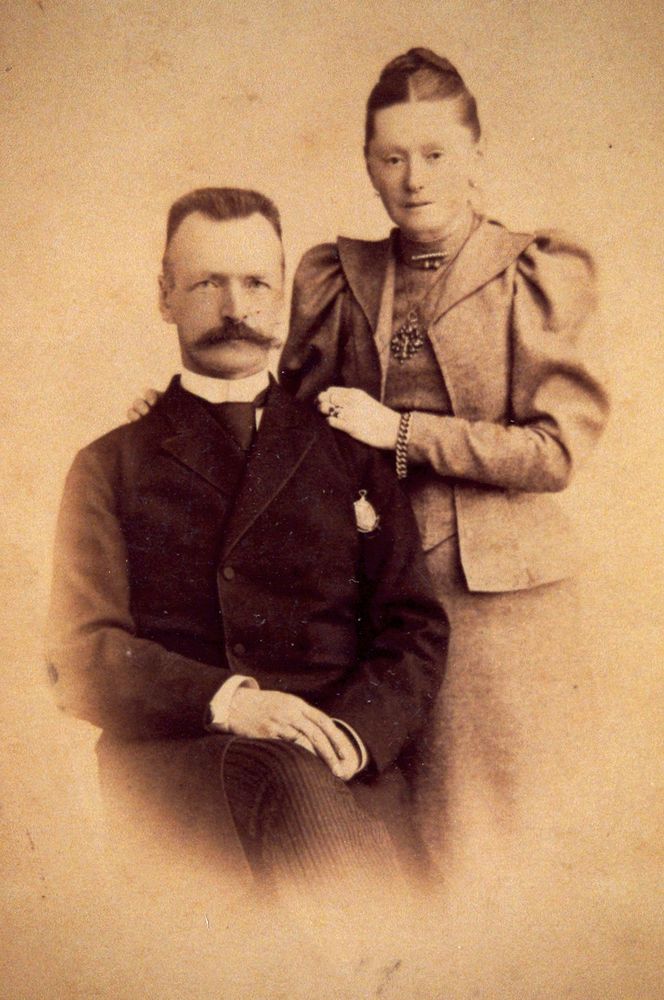
Then I also learned about the tragic story of their eldest son Alexander, who, after marrying Maria Fedorovna Chertkova, lived almost without a break in his parents’ estate: he was engaged in the introduction of the latest agricultural technologies, the construction of industrial enterprises and outbuildings, and raised children.
It was he who turned Alexandria into an exemplary estate, it was his good nature that many legends have survived. Indeed, Alexander Medem combined not only stormy organizational and active qualities, but also possessed incredible mercy and kindness. He could give a cow to disadvantaged children, hire a former convict, from whom everyone turned away, feed the hungry and win over even the most notorious bandit. This was fully manifested after the revolution, when he was repeatedly arrested, sentenced to death, and imprisoned. Local peasants more than once rescued the count.
During the First World War, Count Medem led a sanitary detachment and spent more than a year on the front line, saving soldiers and seeing all the horrors of the war. It was during this period that he decides to convert to Orthodoxy and abandon the Lutheran German faith. The issue of civilizational identity in a difficult time for Russia, when it was at war with Germany, the day of the German Medem was resolved.
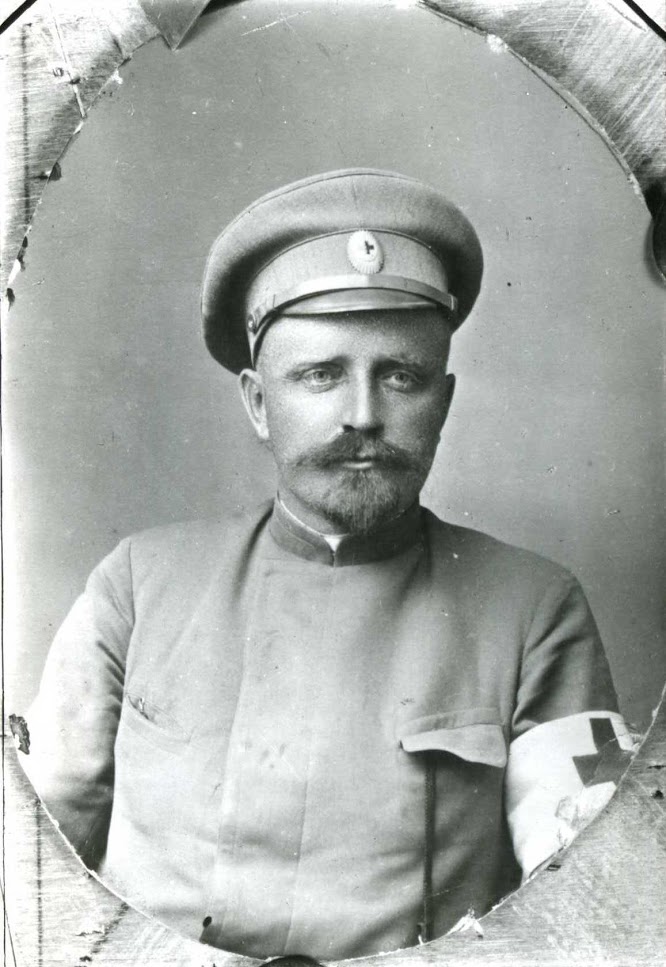
And just a few months later, a revolution happened that not only undermined the political system of Russia, but also smashed the foundations of Russian civilization to ashes. This time Count Medem had no choice. In relation to the new government, he was principled and did not enter into any collusion with her, even when it came to his well-being and life. In letters to relatives, his position was stated with extreme boldness:
“I was really offered to enter the service. But I cannot serve these plunderers of Russia and the plunderers of the soul of the Russian people – scoundrels. To this they tell me that I am better than others? Why can others, if necessary, do this, while I build myself into some kind of exceptional person? I’m not going to build anything out of myself, I don’t exalt myself at all, I just think that the Lord saved me and brought me out of the most seemingly hopeless situations so that I would betray my people, serving their destroyers. I can’t, and I won’t serve – I’d rather die of hunger … ”.
Loss of all property, searches, arrests, interrogations, wanderings in rented apartments, in prisons in Saratov, Volsk, Khvalynsk, Syzran … Diseases and deaths of loved ones. During the years of the fight against God, Count Medem showed people an example of unbending will and fortitude. No trials broke his devotion to Christ.
In one of the letters, he gives parting words to his son Fyodor, who emigrated to Germany:
“Only the belief that not everything ends here with our earthly existence gives strength not to cling to our insignificant life at all costs and to go to any meanness, baseness and humiliation for the sake of its preservation …
Only a deeply and sincerely believer can be truly free. Dependence on the Lord God is the only dependence that does not humiliate a person and does not turn him into a miserable slave, but, on the contrary, elevates him. I am a bad preacher and mentor, but I want to tell you what I feel especially keenly and wish for you.
Believe firmly, without hesitation, always pray fervently and with faith that the Lord will hear you, do not be afraid of anything in the world, except the Lord God and your conscience guided by Him – do not reckon with anything else.
Sheets of paper covered with beaded handwriting were carefully kept by the granddaughter of Count Medem, Olga, in Germany for many years. I managed to find her and in 2002 I met her for the first time in Khvalynsk land, where her father was born and her grandfather passed the way of the cross, who was canonized in 2000 as a holy new martyr and confessor of the Russian Orthodox Church. The glorification took place during the Jubilee Bishops’ Council in the Cathedral of Christ the Savior.
It was the largest canonization in the history of the Church. Together with the Royal Martyrs, the family of the last Russian Emperor Nicholas II, the holiness of more than 1000 martyrs for Christ from the godless authorities of the victims was solemnly proclaimed.
In the fall of 2002, the Medems returned to Alexandria for the first time in many years. Among the old buildings, we came across a small building on which was written “This is a former church. Take care! Without a dome, without an altar, with new-made windows cut through, the building no longer resembled the Temple of God … It was built just a few years before the revolution by Alexander Medem and his wife Maria in honor of the seriously ill daughter Elena.
During her pregnancy, the Countess fell ill with cholera. The medicines that the doctors used to save her affected the unborn child. Severe parental cross and pain. The temple was made in the Old Russian style, and the iconostasis and utensils for the temple, consecrated in honor of the Holy Equal-to-the-Apostles Queen Elena, were created by outstanding artists Dmitry Stelletsky and Vladimir Komarovsky. After years of devastation, the desecrated ruins stood before us.
Olga brought with her copies of photographs from her father’s album, which show his childhood in Alexandria. Unique evidence of the past life: the life and atmosphere of the noble estate of the early twentieth century, photographs capture Russia, which we have lost. What you see is like flying into space!
In 2003 Olga Fedorovna came again. This time, full of determination to revive the temple at all costs. By this time, I had already met the newly appointed priest of the village of Vozrozhdeniye, father Vitaly Kolpachenko. The settlement is located a few kilometers from Severny, and the idea of restoring a new parish in the former estate of the new martyr was quite natural for the rector.
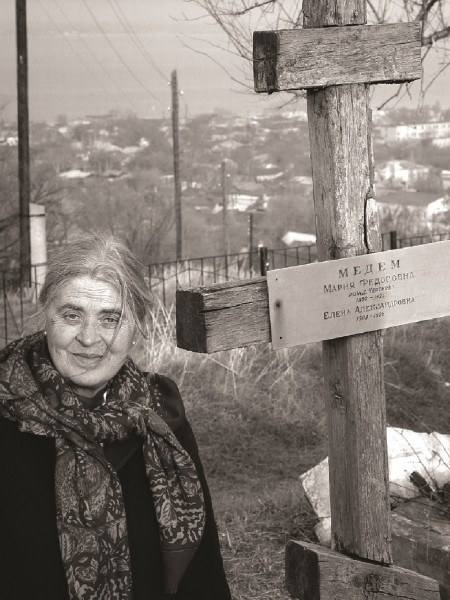
So the stars converged, patrons were found, and in 2007 the temple was restored and ready for worship, becoming a real gem and the main attraction of the village.
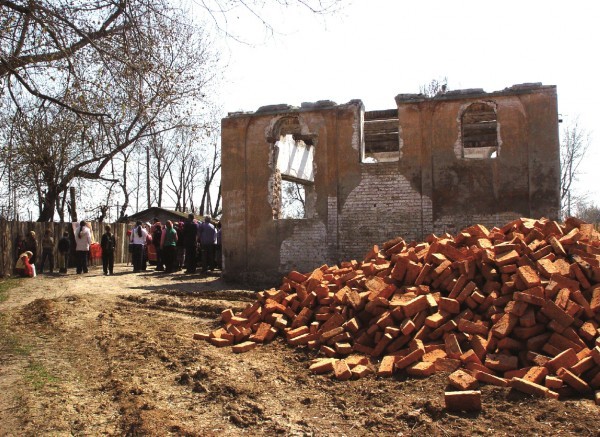
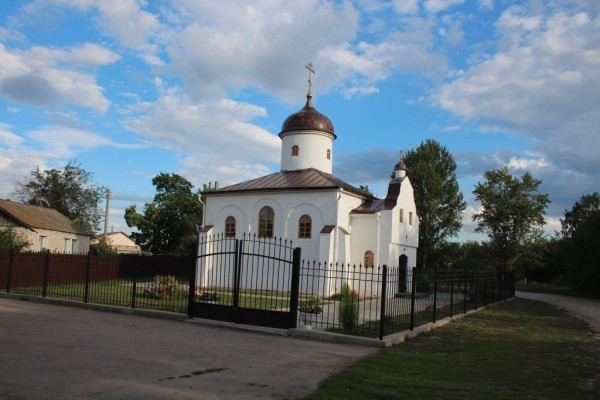
Time passed. Books about Medems were written and published, memorial plaques were installed, books from the library of the count’s family and other family things, archival documents, etc. were located. Art plein airs were organized in Alexandria and historical and art exhibitions were held in Saratov and Khvalynsk.
In 2010, Vitaly Kolpachenko’s father was transferred to Khvalynsk. In addition to setting up parish life, he immediately set fire to the idea of creating an Orthodox gymnasium. In a dying city of 12,000 people!
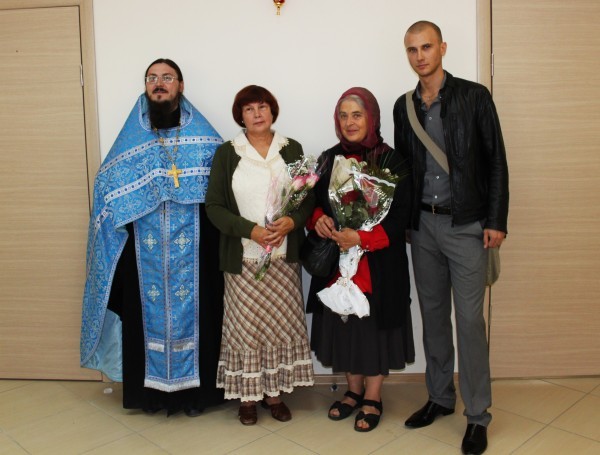
The ambitious project seemed unmanageable to many. But it turned out in spite of everything and thanks to the heavenly intercession of St. Alexander Medem. The Orthodox classical gymnasium was named after him. Today it is one of the best secondary educational institutions in the Khvalynsk region, whose students win various regional, regional and all-Russian competitions and olympiads.
In 2014, a public museum dedicated to St. Alexander Medem was created at the gymnasium. During the short time of the existence of the museum, it was visited by teachers and students of almost all educational institutions of the region.
The spiritual feat of the new martyr became an important component of the educational process in the gymnasium, forming historical memory and the very identity for which St. Alexander fought. In 1926 he wrote to his son:
“The pressure on the Church, which at one time weakened, again, apparently, is growing stronger … probably, this wave will come to us too. In this case, of course, I will fly first.
I am not at all afraid of this – I will even be glad of it. But one thing is disgusting – they will admire us, shed tears, consider us martyrs for the Orthodox faith, etc. – but no one will want to risk themselves, and we will be in an insignificant minority. This, of course, is reasoning from the evil one. Everything is the will of God. We will do our job, and, of course, our blood (if it is destined to be shed) will not be wasted.”
Martyr Alexander Medem by Alexey Naumov
Martyr Alexander was born in 1877 in the city of Mitava, Courland province, into the family of Senator Anton Ludwigovich Medem, who held many prominent government posts, in particular, the governor of Novgorod. He was a man of whom the people have preserved the kindest memories. During the unrest in the Novgorod province in 1905, he traveled unaccompanied to the scene. He rode up in a chariot to the rebellious crowd, boldly entered the middle of it, bowed to the people, took off his cap and began to speak in a low voice. His appearance and manner of speaking made a stunning impression, at first there was a noise, but soon everyone calmed down, and people listened with interest to the governor. In Novgorod, he had to intercede for a widow, from whom one merchant tricked out bills for a large sum. Arriving to him, Anton Ludwigovich asked to see the bills and, having received the papers, threw them into the fire blazing in the fireplace. And then he said to the merchant: “I had no right to do so, and you can sue me.” The merchant, however, did not sue, and the widow was saved from ruin.
In the 1870s, Anton Ludwigovich bought an estate of six thousand acres of land in the Khvalynsky district of the Saratov province. Subsequently, his son Alexander Antonovich sold two thousand acres of them to the peasants at the lowest price.
Alexander graduated from a gymnasium in Novgorod, and then in 1897 from the law faculty of St. Petersburg University, but the legal service did not attract him. From infancy, he became attached to the earth. Almost no agricultural work took place without his participation, which contributed to the acquisition of many practical knowledge in the field of agriculture and the development of a deep love for the native land and people.
In 1901, Alexander Antonovich married Maria Feodorovna Chertkova. Subsequently, they had four children – a son and three daughters. The son emigrated to Germany after the revolution, one of the daughters was shot in 1938.
Until 1918, Alexander Antonovich managed the estate. After the Soviet government had confiscated all private land holdings, he began to rent a few acres of land, as much as he could cultivate himself. They did not live well; funds received most often in debt, his family sometimes only had enough to buy seeds and carry out the most necessary agricultural work. In other times, there was no horse, and the site was located thirty kilometers from the city, and it was necessary to get to it either on foot or with passing carts.
When the civil war began, Alexander Antonovich and his two brothers agreed that, being Russians, they would not raise a hand against their own and would not take part in the civil war. In 1918, the Bolsheviks arrested him and sentenced him to death, but on the eve of the execution of the sentence, they let him go home to say goodbye to his relatives. He was about to return to prison the next morning, but in the morning the Bolsheviks were driven out of the city by the Whites, and the sentence was canceled by itself. In the summer of 1919, he was again arrested and imprisoned in the city of Saratov. Returning from prison, he said that nowhere did he pray so well as in prison, where death knocks on the door at night, and whose turn is unknown.
In the summer of 1923, the OGPU again arrested Alexander Antonovich, and he was imprisoned in the city of Saratov. During the interrogation, the investigator asked him how he would organize a livestock farm. Alexander Antonovich told, going into all the details. The investigator listened to him with interest and exclaimed in conclusion: “Oh, I love such people! Only, of course, we won’t let you run any household!” At the end of October 1923, Alexander Antonovich was released and returned to his family.
Arrests and hardships hardened his soul and strengthened his faith. He wrote to his son Fyodor in 1922: “… One of these days your birth – you will be twenty-one years old, that is, civil majority. I will especially fervently pray for you, my boy, that the Lord will help you worthily and possibly righteously go through your earthly path and save your soul, give you happiness, strength both mental and physical, courage and boldness, and strong unshakable faith. Only the belief that not everything ends here with our earthly existence gives strength not to cling to our insignificant life at all costs and to go to any meanness, baseness and humiliation for the sake of its preservation …
Only a deeply and sincerely believer can be truly free. Dependence on the Lord God is the only dependence that does not humiliate a person and does not turn him into a miserable slave, but, on the contrary, elevates him. I am a bad preacher and mentor, but I want to tell you what I feel especially keenly and wish for you.
Believe firmly, without hesitation, always pray fervently and with faith that the Lord will hear you, do not be afraid of anything in the world, except for the Lord God and your conscience guided by Him – do not reckon with anything else; never offend anyone (of course, I’m talking about a bloody, vital offense that remains forever) – and I think that it will be good.
Christ is with you, my boy, my beloved. Mom and I constantly think about you, thank God for you and pray for you … I hug you tightly, baptize and love you. The Lord is with you. Your father”.
In 1925, his wife Maria Fedorovna wrote to her son Fedor, who lived abroad: “… I also want to tell you about dad, but I don’t know if you will understand me. We live in such different conditions of life that many things may seem incomprehensible to you.
Over the years, he has grown unusually morally. I have never seen such faith, such peace and tranquility of soul, such true freedom and strength of spirit. This is not only my opinion, which can be biased. Everyone sees it. And by this we are alive – nothing more, for the very fact that we exist as such a family, having nothing but hope in the Lord God, proves this.
Adversity, illness, hard work, which sometimes became unbearable, led to the fact that Alexander Antonovich had to leave work on the ground. He wrote about this to the children: “I have no doubt that, perhaps, I deserve serious reproaches: I, de, a person full of strength and health, indulge in a contemplative lifestyle, sit doing nothing and scream for help. But the thing is, I have no other choice. I was actually offered to join the service. But I cannot serve these plunderers of Russia and the plunderers of the soul of the Russian people – scoundrels. To this they tell me that why am I better than others? Why can others, if necessary, do this, while I build myself into some kind of exceptional person? I’m not going to build anything out of myself, I don’t exalt myself at all, I just think that the Lord saved me and brought me out of the most seemingly hopeless situations so that I would betray my people, serving their destroyers. I can’t, and I won’t serve – I’d rather die of hunger. There is nothing to think about private service or any business of one’s own. Everything is nipped in the bud… So you have to sit and wait, wait, as now 95% of the Russian people are waiting for some deliverers from somewhere…”
At the same time, he wrote to his son about the situation in the country: “… Please do not believe that life is in full swing here, industry is developing, peasant economy is being restored, and so on. All solid fiction, like everything that comes from us. I don’t know a single peasant who has three horses… Nothing at all. And for what is, the prices are crazy, the products of the peasant economy are depreciated to the last extreme …
The pressure on the Church, weakened at one time, is rising again. Metropolitan Peter (Polyansky. – I. D.) is sitting …
In the Caucasus… the last churches are taken away from the Orthodox and handed over to the “alive” – these antichrist servants. We are still quiet, we have no “live” people. But, probably, it will come to us as well. In this case, of course, I will fly first. I’m not at all afraid of this, I’ll even be very glad … God’s will for everything. We are doing our job, and, of course, our blood, if it is destined to be shed, will not be wasted … I bless you, my boy, for life. Live simply, honestly, in a divine way. Never give in to despondency…”
In 1928, Alexander Antonovich was arrested and imprisoned in the city of Saratov. At the end of the investigation, he was sentenced to deprivation of the right to live in six large cities and settled in the city of Syzran, close to his native places. By this time, he had become a widow, and his daughters went with him to the city of Syzran, one of whom got a job in the Regional Medical Administration.
In the autumn of 1930 Alexander Antonovich was again arrested. During the interrogation, the investigator asked him what his political beliefs were and what his attitude towards the Soviet regime was. Alexander Antonovich answered: “I have no definite political convictions, since I was not involved in politics. My attitude towards the existing system is loyal. I do not agree with the program of the Communist Party and the Soviet government.”
During interrogations, Alexander Antonovich behaved with great restraint and dignity, although at that time he was seriously suffering from pulmonary tuberculosis, which he had been ill for several years. The investigator argued that the arrested person was obliged to answer all questions, but Alexander Antonovich, who graduated from the Faculty of Law, had a different point of view and answered the investigator’s questions as follows: “There are no acquaintances in the city of Syzran whom I visit or who visit me. There are few “hatted” acquaintances, that is, persons whom I know by name and in person; there are also such persons in the city of Syzran with whom I bow when I meet on the street, but I often do not know their names. It is difficult to name those persons whom I know by name and in person, because I know very little of them and do not want to expose them as my good friends.
– So do you have people you know in the city of Syzran? the investigator asked.
– There are people I know in the city of Syzran. I can’t name them because I can’t remember them.
– Do you refuse to name the people you know, citizen Medem, or not?
I refuse because I can’t remember.
– From your answer, citizen Medem, it follows that, on the one hand, there are people whom you know, and on the other, you do not know them.
– In fact, it is.
Such an answer baffled the investigator, and, wanting to put pressure on the arrested person, he dictated to him the text of the warning: I know in the city of Syzran, I prevent the clarification of all the circumstances of the case and, thus, relieve the Syzran department of the OGPU of responsibility for observing the relevant procedural norms regarding the term of detention.
Signing under the warning, Alexander Antonovich wrote an addition to it: “Of the persons whom I know by name, patronymic and surname, I remember some at this time, but I refuse to name these too for the reason that I nominate people whom I accidentally remembered, thereby committing injustice towards them, I do not find it possible.
Thus, the case never came to an indictment. At the beginning of 1931, the tuberculosis process in the lungs worsened in Alexander Antonovich, which was associated with difficult prison conditions, and on February 22 he was transferred to the hospital building of the Syzran prison.
Daughters, having learned about the serious state of health of their father, began to seek a date. They were allowed, saying that they would come tomorrow. But when they came the next day, they were told that their father had been buried yesterday, but they refused to name where. Alexander Antonovich died in the prison hospital on April 1, 1931 at half past one. They buried him in absentia in the cathedral of the city of Syzran.
On November 19, 1937, the Troika of the NKVD sentenced Archbishop Augustine (Belyaev), Archimandrite Ioanniky (Dmitriev), Archpriest John Speransky, psalmists Alexei Gorbachev, Apollon Babichev, and church council member Mikhail Arefiev to death.
Archbishop Augustine, Archimandrite Ioanniky, Archpriest John, psalm-readers Alexei Gorbachev, Apollon Babichev, and church council member Mikhail Arefiev were shot on November 23, 1937, and buried in a common unknown grave.
Игумен Дамаскин (Орловский)
“Martyrs, confessors and ascetics of piety of the Russian Orthodox Church of the XX century. Biographies and materials for them. Book 5″. Tver. 2001, pp. 365–414
Источник: http://www.fond.ru/
Count Martyr Alexander Medem by Alexey Naumov
August 8 at the former estate of the Counts Medemov Alexandria in Khvalynsky district of the Saratov region will host the Second historical and cultural holiday “Return to Alexandria”. The holiday will begin with a prayer service in the estate Church in the name of Equal-to-the-Apostles Helena, restored in 2007. The program of the holiday includes a presentation rural development project “Return to Alexandria”, showing and discussion of the documentary film by Sofia Gorlenko and Gleb Kuznetsov “Atlantis of the Russian North” – about the history of the distant Russian province of the Arkhangelsk-Vologda region, acquaintance with the estate, screening of the film by Alexei Naumov “Medem” – about New Martyr Alexander Medem, others Events.
The life path of Count-martyr Alexander Medem dedicated to the article published by us.
Christmas 1915 representative of the old Balto-German family Count Alexander Ottonovich Medem met at the forefront of the Western Front along with the soldiers. From the Saratov provincial zemstvo, he accompanied there wagons with gifts. A few months later Medem returned to war zone as chief medical nutrition team. Sometimes under a flurry of hurricane fire, volunteers from the “letuchki” took out wounded soldiers from the battlefield, provided them with the necessary medical and health care.
Count Medem has seen the face of death more than once … and it had with him a blood connection: German technology of mass destruction , enemy soldiers armies with whom he could speak the same language and with most of which he was one Lutheran faith … On the other hand, there were Russian men – the same ones with whom he grew up on his parents’ estate on the Volga, with with which he plowed the land, sowed and harvested, ate the same food … Now they were dying before his eyes from chemical burns and gunshot wounds.
In war as in war. Alexander Ottonovich’s heart is not survived. After a severe attack in the spring of 1916, he was forced to leave the detachment and return to his family on his farm Alexandria, in the Khvalynsky district, in the north of Saratov provinces. There, on June 16, he converts to Orthodoxy, makes it’s secret. And this choice was the beginning of his journey to Golgotha.
Alexander Medem was born on December 8, 1877 in Petersburg in an aristocratic family. His father is Count Otton Ludwigovich Medem at various times was Novgorod governor, senator, member of the State Council, belonged to an old and influential Courland family. Mother – Alexandra Dmitrievna Naryshkina – came from a well-known, related Russian imperial court of an aristocratic family.
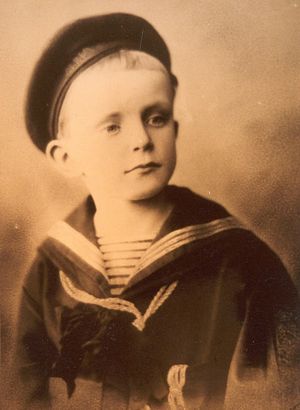
Contrary to laws of the Russian Empire, Alexander Medem was baptized into the religion of the father – Lutheranism, for which it was received the highest resolution.
Childhood Alexander passed mainly in the Saratov province, where back in 1875, in the Khvalynsk district, his parents acquired lands, the center of which was the farm of Alexandria. Estate located in the narrowest part of the Volga watershed and Tereshki. In the possession of the Medems were also transport and fish fishing on the Volga with adjacent islands.
Alexander fell in love with the Volga regions that became his native and village life
Over time, Alexander fell in love with those who became for him native Volga region and village life. From an early age, he showed interest in the field, and when he grew up, then neither one agricultural work on the farm was not enough without this lively, cheerful, businesslike and quick-witted a boy who took in everything the most active participation.
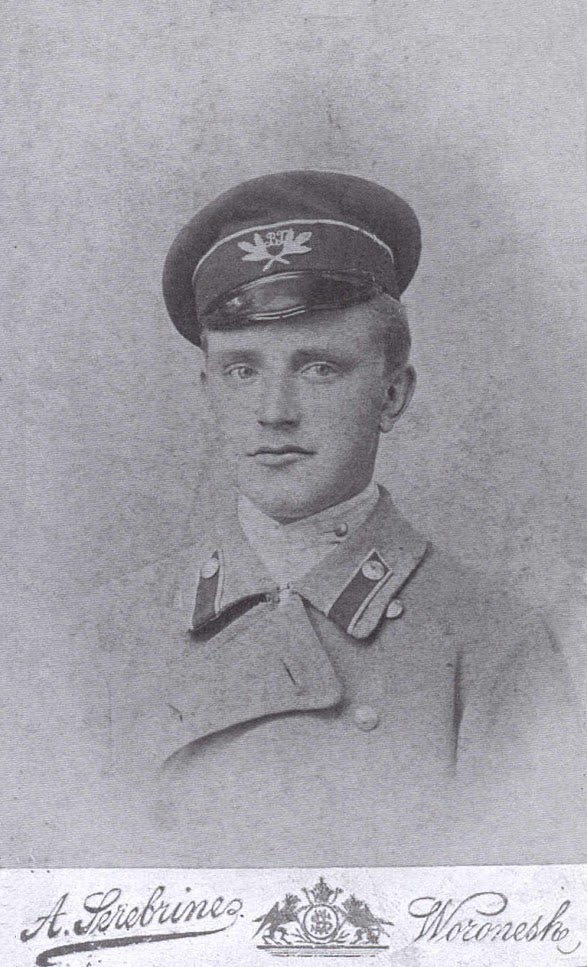
AT May 1893 Otton Ludwigovich was appointed Voronezh vice-governor. In Voronezh Alexander entered the gymnasium. Acquaintance took place there. Medemov with an influential noble family of this city – Damn. The Chertkov family brought up two children – son Michael and daughter Maria.
Maria Fedorovna was a very beautiful girl with large blue eyes and thick black hair, while very shy. She got typical for that time home educated, fluent in English and French, drew well, was very well-read, had a deep mind.
In 1896, Otton Ludwigovich was appointed Novgorod governor, and the Medems moved to Veliky Novgorod. There Alexander graduated from the local gymnasium and in 1898 continued studying at the Faculty of Law of St. Petersburg university.
Alexander Medem and Maria Chertkova met in the capital again, and this meeting ended with a wedding on May 5, 1901.
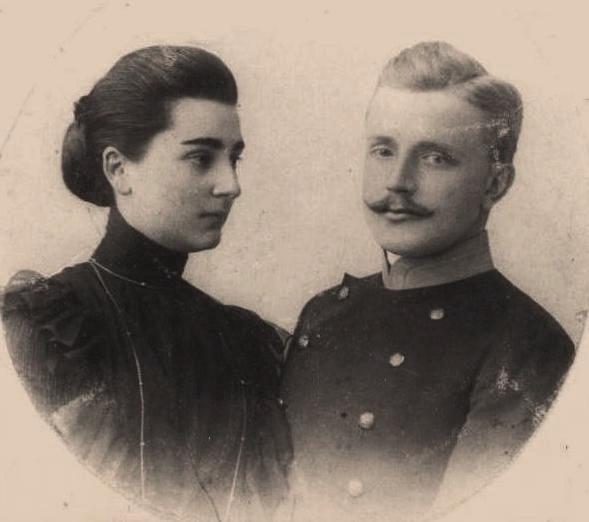
“Father is accustomed It is easy to communicate with people and win everyone over. Myself always preferred the company of ordinary people”
For permanent residence, the newlyweds chose Alexandria. They could well nestle in their own estate Alexander Ottonovich Kaugershof in Courland or in the estate of Maria Feodorovna, located in Bessarabia, but the head of the family was attracted by the lands loved since childhood with sparkling on the sun, cut through by the islands of the Volga, loans, endless fields and oak forests, meadows with fragrant strawberry berries. To the whole world Count Medem preferred Alexandria. According to contemporaries, he knew every hired peasant and selected only the best workers, personally toured the property and monitored the course of work, he could eat from the same boiler with the workers, walked in a peasant kosovorotka. His daughter Alexandra later writes: “Father was accustomed to easily communicate with people and win everyone over. I myself have always preferred society ordinary people (in particular, peasants). He was able to keep himself, respectively, in any society, but did not like to be in those aristocratic circles where there were many conventions.”
At the beginning of the 20th century, an active construction. A steam mill, a cheese factory are being built, barns, a silo, a wooden glacier, a greenhouse and other commercial buildings. A bread factory worked on the Volga pier. All the latest achievements of agronomic science and technology: on the farm – mechanical drinkers, on mill – power plant, were purchased locomobiles, steam engine, threshers.
On the bank of the Lower Pond there is a stone manor house; parks, alleys, gardens, flower beds and front gardens fenced with low wooden fences with oaks and blue firs. They walked around, dismissing rainbow tails, peacocks.
Alexandria became a model estate with a developed infrastructure, special cultural environment and harmonious social relations
Alexandria became a model estate with a developed infrastructure, special estate cultural environment and harmonious social relations. Here Alexander Ottonovich and Maria Fedorovna built their happy life, here they had children: July 25, 1902 the first-born is born – the son of Fedor, later three more daughters: April 10, 1904 Sophia was born, September 8 1908 – Elena, and May 14, 1911 – Alexandra. All of them were baptized into Orthodoxy.
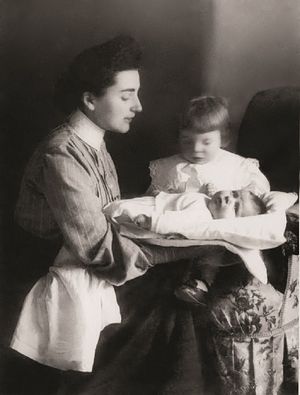
Junior daughter later writes: “Being a human being by nature domineering, stubborn and loving to do things his own way, father managed the affairs and the whole external life of the family. But inner, spiritual life and by himself as a person was led by my mother, who was both spiritual and spiritual for my father. moral authority.”
A heavy cross and inconsolable grief for Alexander Ottonovich and his wife had the middle daughter. Elena’s birth was preceded by cholera in the pregnant Maria Feodorovna. The illness and the medicines used to save her affected her health of the unborn child. When the girl appeared light, parents began to notice that she was not developing fine. Elena could not speak, consciously own body and even chew. But despite the severity of the illness Elenushka, as her relatives affectionately called her, was gone. idiotic expression.
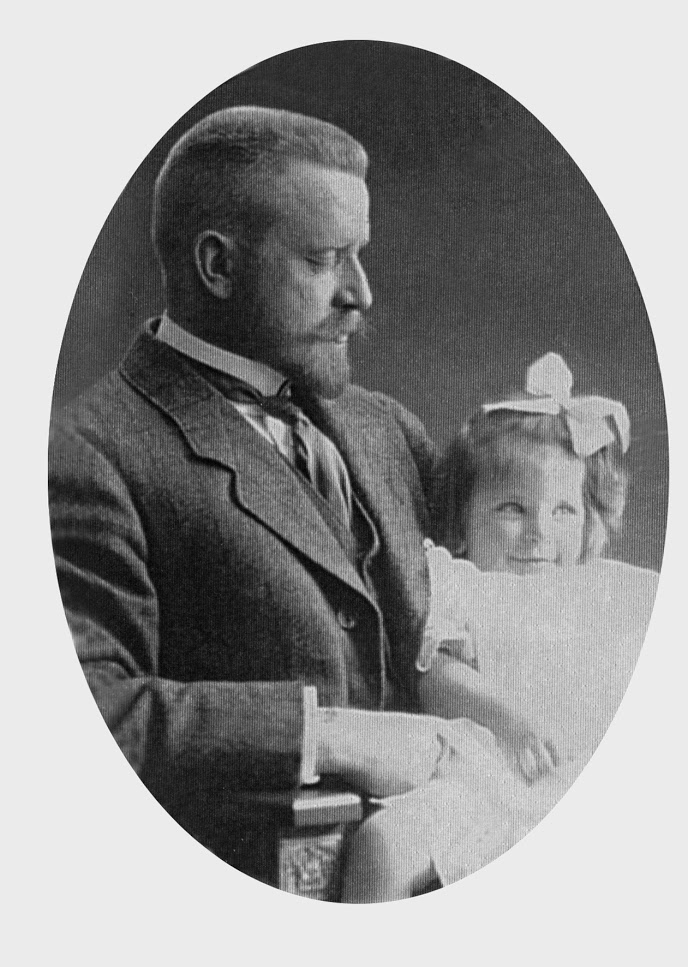
“When spoke strictly, – recalls her youngest sister, – she cried when caressed – she smiled. Smiled and rejoiced at the appearance before her mother, reacted to the sound of dishes when she was hungry. More than all the children, she looked like a mother: huge blue eyes, black eyebrows and hair, tender skin … The poor thing had seizures of convulsions in just body, and it was very painful. She screamed and the heart of the parents broke.
Elenushka needed constant care. Alexander Ottonovich and Maria Feodorovna took various measures to treat daughters, took her for examinations to the best doctors not only Russia, but also Switzerland. Illness is not retreated. Difficult circumstances have become the next step in the spiritual growth of Alexander Ottonovich. At the request of the wife he is laying an Orthodox church in Alexandria in the name of Saint Helena – the heavenly patroness of Helenushka.
In 1910-1912, a stone single-altar church in Alexandria was erected and consecrated on October 17, 1913 of the year. The iconostasis for the church was made by famous masters Vladimir Komarovsky and Dmitry Stelletsky.
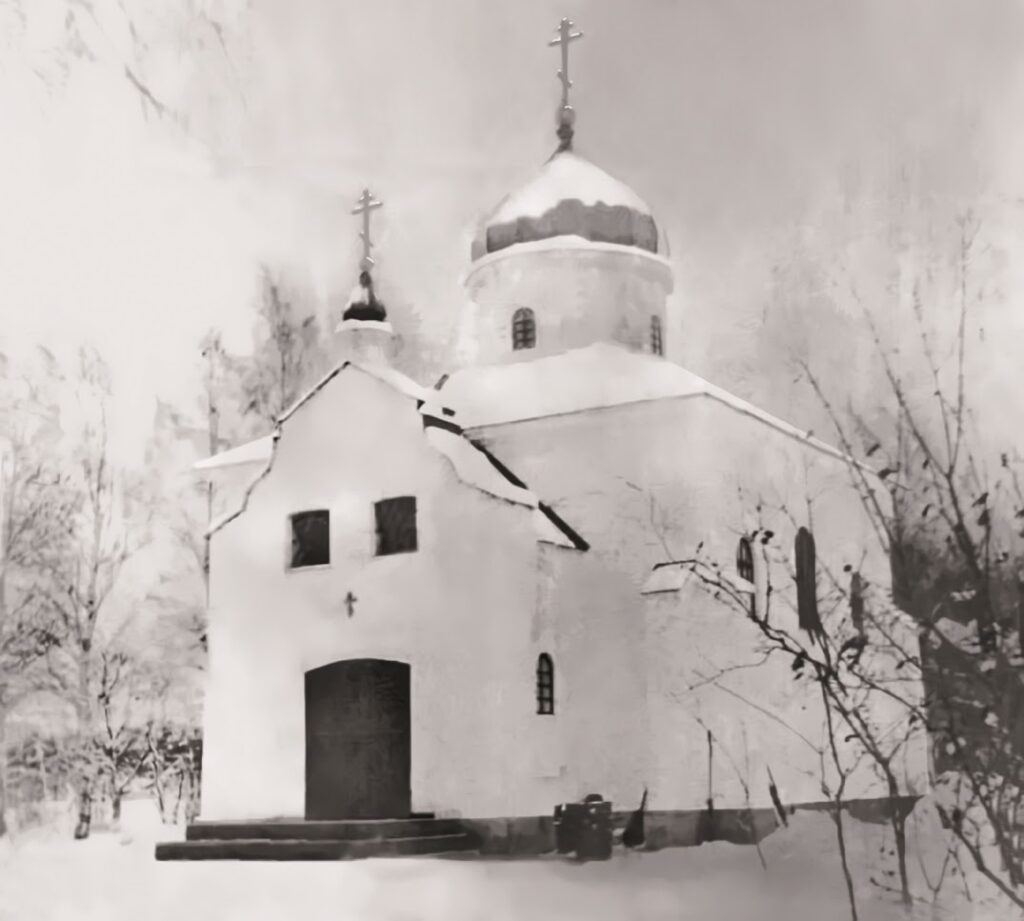
In the autumn of 1914, Alexandra dies in Petrograd. Dmitrievna Medem. The loss of a mother did not undermine the moral forces of Alexander Ottonovich. Shortly after a family tragedy he takes an active part in supporting the Russian army, fought on the fronts of the First World War. In the middle of December 1914, he accompanies a train to Poland with gifts for soldier of the 47th division once stationed in Saratov. At the front, Count Medem met the new year 1915, and on January 9 returned back.
The horrors of war further strengthened deep patriotic feelings of Alexander Ottonovich. Soon he went back to the front, but already as the head of the sanitary detachment All-Russian Zemstvo Union. There he decides become Orthodox.
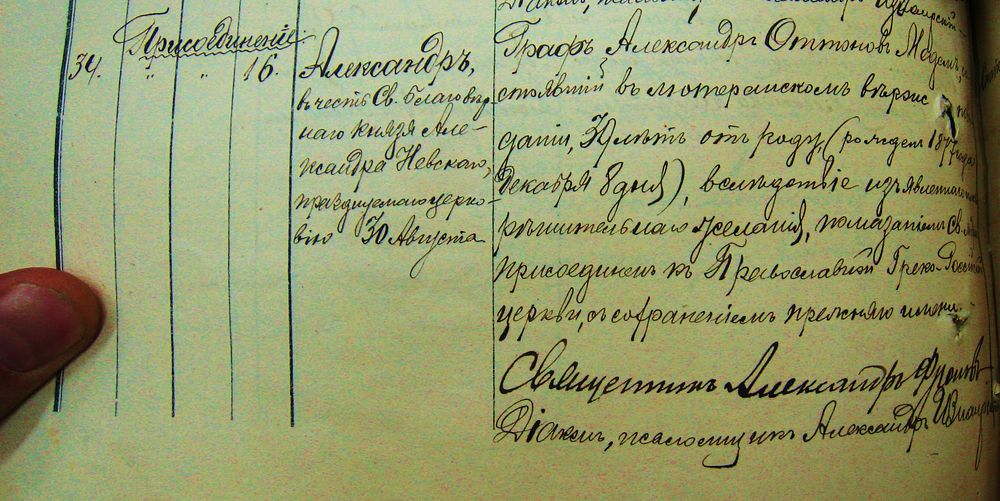
The revolutions of 1917 undermined the foundations of the Russian statehood and national identity. All potential opponents of the criminal Bolshevik regime became its victims, sometimes innocent. In that At that moment the life of the Medems also changed.
Alexandria was nationalized. The family moved to neighboring Khvalynsk, where she was temporarily received by friends. On the at first, the family and servants lived on “farm” stocks and available facilities.
“AT memory: the hateful eyes of a man in a leather jacket rummaging through our things”
Only Alexander’s father Otto managed to emigrate Ludvigovich, brother Dmitry and later son Fedor. Second brother, George, officer of the White Army, died near Samara. Alexander Ottonovich himself as a former “exploiter” and “bourgeois” repeatedly arrested, which was preceded by searches in apartment. His daughter recalled: “In those years they were looking for weapon. And although they didn’t find anything like that, they took my father away. AT memory: the hateful eyes of a man in a leather jacket rummaging through our things. Accompanying him take with hands from the table pieces of boiled meat cut for dinner and bread, greedily eat. This is for the alien authorities my father was a landowner and a “class enemy”. Local communists and ordinary people who knew and loved “count” as a person, more than once rescued his”.
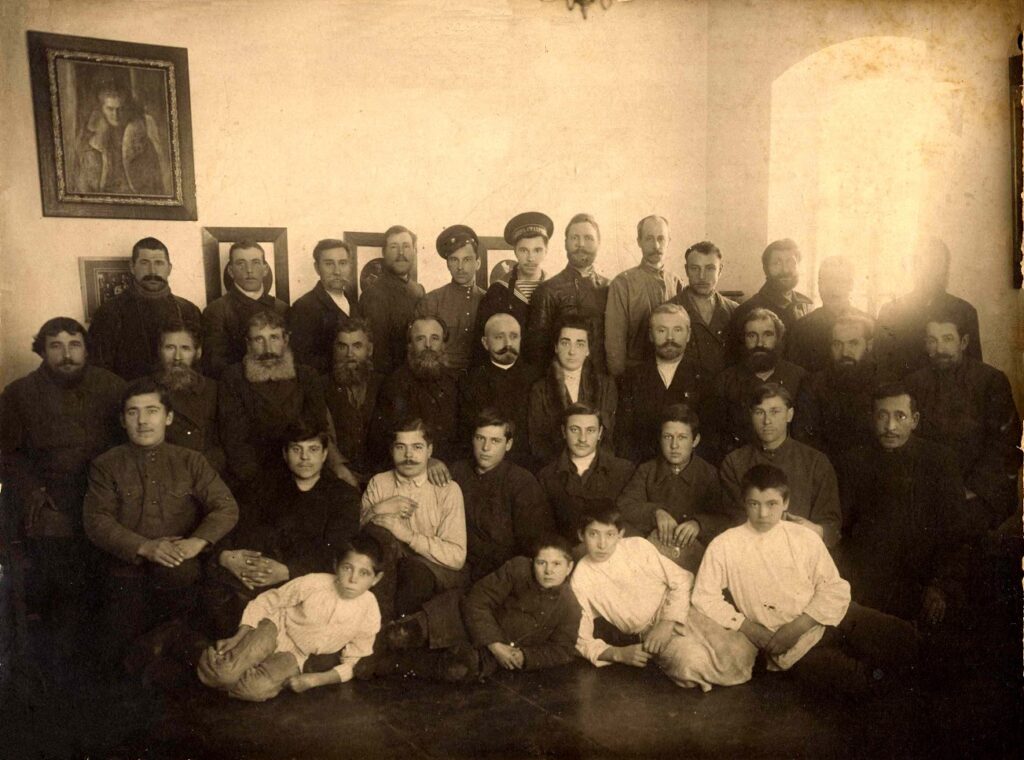
During one of the arrests in the summer of 1918, Alexander Ottonovich was sentenced to death. People who respected the count offered to organize an escape, but he refused. At night before being shot, under great secrecy, Alexander was allowed sleep at home and say goodbye to family. He was released without convoy, on parole, with the condition that in the morning he will return and will not fail the one who let him go. So Alexander Ottonovich with Maria Fedorovna, after spending the whole night on balcony of the rented apartment, prepared for a terrible denouement, and at dawn … cannonade! Bolsheviks without battle surrendered the city to units of the People’s Army of KOMUCH, the verdict canceled itself.
But by autumn, Soviet power in the city was restored. Alexander Ottonovich was arrested again. Behind his release from Maria Feodorovna demanded a large amount of money that the family did not have. Then she turned to the Khvalyn mullah, who had known and respected the Medems for a long time. The Tatar community collected the necessary amount, and Count Medem was released.
Searches, arrests, imprisonment more than once broke into the Medem family.
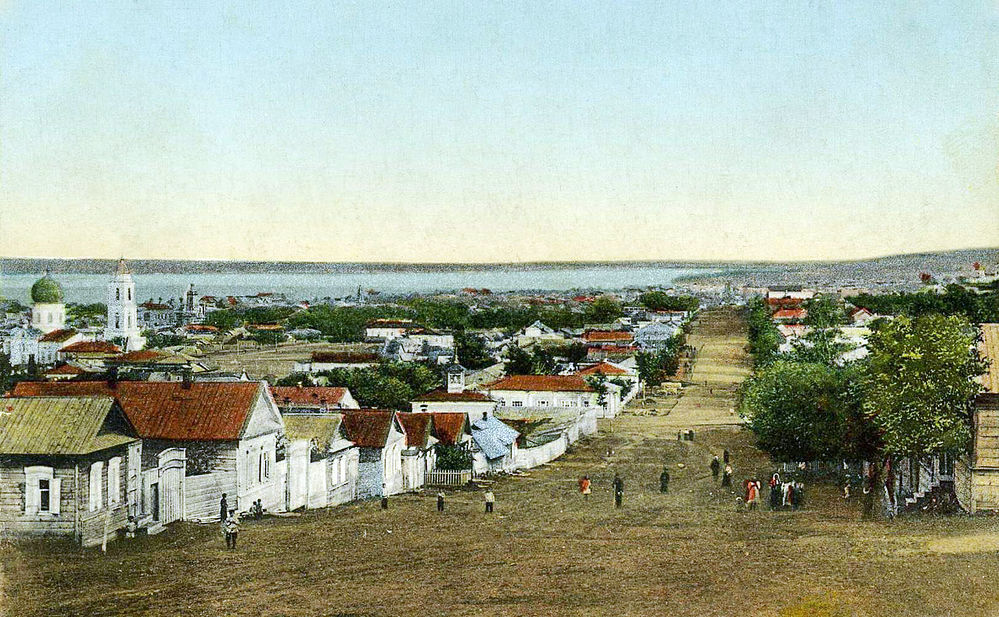
Since 1921, Alexander Ottonovich, and after him the whole the Medem family went to services for the most part outside Kazan Cathedral, and in the church of the male Holy Trinity monastery. This was due to the transition of almost all parish churches of Khvalynsk during the Renovationist schism.
Khvalynsky Holy Trinity Monastery under the zealous pressure of the Count Medema began to resist the renovationists
In the monastery, Count Medem and other believers organized church council. Khvalynsky Holy Trinity Monastery zealous pressure of Count Medem began to resist renovationists. On behalf of the believers, Alexander traveled to Saratov to one of the main opponents of the “Live church” in the province to Bishop Peter (Sokolov) with a request to accept their coming into his flock.
Alexander Ottonovich watched with pain what was happening in his country. In one of the letters to his son, he vividly described his experiences: “My dear Fedyushok. One of these days yours birth – you will be 21 years old, that is civil age. I will be especially warm for you my boy, pray that the Lord will help you with dignity and it is possible to righteously walk your earthly path and your soul save, gave you happiness, strength both spiritual and bodily, courage and boldness and strong unshakable faith. One only faith that not everything ends here with our earthly existence, gives strength not to cling to anything became for his insignificant life and for the sake of its preservation to go to any meanness, baseness and humiliation. This is what we are seeing at every step, and sick of it all to the fullest disgust for everyone around.
From a letter A. Medema to his son: “Indeed, he can be free to be only a man, deeply and sincerely believer”
Truly free can only be a man, deeply and sincere believer. Dependence on the Lord God the only addiction that does not humiliate a person and does not turns into a miserable slave, but, on the contrary, exalts. I am a bad preacher and mentor – but I want to to tell you what I feel especially keenly for you wish. Believe firmly, without hesitation, pray always fervently and with faith that the Lord will hear you. Nothing in the world fear, except the Lord God and your conscience guided by Him, – do not reckon with anything else; never nobody offend (of course, I’m talking about a blood, life offense, which remains forever) – and I think, good will…”.
The letter was written at the height of the anti-religious campaign. AT Saratov on July 26 Bishop Peter and priests were arrested large parish churches and cathedrals. Alexander Ottonovich could not have known about it. Therefore, the letter reflected his internal protest.
As early as July 25, 1923, the commissioner, examining the mined investigative material, concluded that in the Saratov province under the guise of a religious society, there is a secret organization of the clergy and monarchist-minded laity. “Inspirers and leaders of the organization are Sokolov Pavel Ivanovich, calling himself “Bishop Peter”, priests Anatoly Komarov Andreevich and others.
The relationship of Alexander Ottonovich with Bishop Peter and his activity as a member of the church council is not remained unnoticed by the investigator. His “recognized” as an active participant in the above organization and, moreover, its representative and organizer in the city of Khvalynsk. He also allegedly “Kept in touch with the head of this organization citizen Komarov Anatoly, from whom he received specific instructions on organization plans and methods of struggle against Soviet power, according to intelligence data, he personally expressed confidence that now it will not be possible soon put an end to sovereignty.”
So Count Medem got into a group investigative case for number 1200, brought against the clergy and laity Saratov province, headed by Bishop Peter (Paul Sokolov); 36 people were involved in the case. August 23, 1923 Alexander Ottonovich was again arrested and sent to Saratov prison.
However, the investigative material was not enough, and the accusation collapsed. In October, “for lack of evidence corpus delicti” Count Medem was released. Many of those involved in Case No. 1200 were convicted. Bishop Peter exiled to the Solovki.
“Such faith such peace and tranquility of soul, such true I have never seen freedom and fortitude in my life”
Trials hardened the soul of Alexander Ottonovich. His wife reports in one of his letters: “Over the years, he morally grown extraordinarily. Such faith, such peace and peace of mind, such true freedom and fortitude I have never seen in my life. This is not only my opinion, which can to be biased – everyone sees this, and this is what we are alive – nothing more, because the very fact that we are such a family exist with nothing but hope in the Lord God, it proves…”.
In the labors and cares for loved ones, Alexander Ottonovich met another test. In February 1925, Maria fell ill Fyodorovna. By the end of autumn, it was clear that she could no longer be saved.
Alexander Medem wrote to his son: “My dear boy. Today is the eighteenth day that my mother passed away, and I I can’t bring myself to write to you. First time just from physical fatigue, I could not write (wrote one word instead of another) and now I can’t get myself together with thoughts and memories to describe everything to you in detail.
Since the beginning of October, it has become much worse – a process began in her throat, she chewed with difficulty, spoke in a whisper. Every sip lately has been suffocating cough. Often she suffered from spasms in her throat (this was most painful). She lost weight terribly and weakened quickly. Especially the last days. She suffered terribly, poor thing. Several times she wept bitterly, like a little child, and said: “If only the Lord had pity on me and stopped my suffering.” At night she slept sometimes well thanks to drugs, but often woke up and prayed. She often said, “Lord! I bring you mine suffering.”
I prayed so much for her recovery, with such faith that before last day I did not allow the thought that the Lord would refuse me. And in her I maintained this confidence, and she believed…
The last two days I did not sleep at all, although she slept. On Sunday, I didn’t go to mass, because I didn’t want her leave (although I did not believe that this was the end) … Hours in 5 p.m. she could no longer expectorate, and then it was just me I realized that the Lord God does not want to satisfy my prayer. I suggested that she send for Fr. Peter, “to pray”. She gladly agreed and wished take communion. At 8 o’clock he communed her, and she calmed down and quieted down. I held her hand the whole time. She called first Dinu, blessed her and then pressed my head to her chest, began to baptize her and say: “Now I will say goodbye to children – my Fedyushenka, my boy, I bless you for a happy life, Christ is with you, my Fedushok. Then Sofinka … Then my brother Misha… Then Aunt Grusha. Then Katya. (I write, as she said.) After that, she called her aunt in turn Mimi and Zinovia Mikhailovna, Grusha and her daughter, and with all said goodbye. She did not call Elenushka, but I did not to remind, assuming that she does not find it necessary with her say goodbye, expecting to meet her soon in a better world. (Elenushka is very bad now – we are waiting for her death hourly.)
My heart was breaking, and I told her to let me The Lord called rather – “I can not live without you live”. She held my head tightly and said: “Don’t cry, my dear, I know you will soon you will be me.” Her eyes were always fixed on the icon of the Mother of God, which hung on the front wall, and she prayed until the last minute … I feel so terrible I wanted to hear her more, that I could not stand it – hugged her and said: “Manyushenka, tell me at least one another word.” She squeezed my hand tightly and said quite clearly: “My dear, I feel so good, so good – just feel sorry for you.” After that she didn’t speak anymore. In her chest, everything was bubbling quieter, and after the last words, no more than through 5-7 minutes, she passed away. Such a h at the bottom I have never seen death. Fully conscious and calm spirit. Indeed, “painlessly, shamelessly and peacefully.” As for the “good answer” no doubt either. Apparently the Lord did not find possible to fulfill our request. I have a heart is torn, but still it must be said that the Lord knows best what we need. Obviously, it is necessary, and, obviously it’s better. May His will be done…”
Maria Fedorovna died on December 6, 1925 at half twelfth night. Twice a day they served a memorial service for deceased. Out of respect for Alexander Medem, this took participation of the entire clergy of the city. Came to sing and the cathedral choir.
The suffering of poor Elenushka ended on the first day of Easter May 3, 1926. She was buried next to her mother and grandmother. After the death of his wife and daughter, Alexander Ottonovich almost every day I went to the cemetery to the graves of my relatives and to services in the monastery church. “So prayed, so prayed … During the service, sometimes sniffed – choked the tears that he brushed away with stumps finger, ”recalled Alexandra.
“Alive” we do not have. But, probably, this wave will come to us too. AT In this case, of course, I will fly first. I don’t care not afraid”
In 1926, he wrote to his son: “The pressure on the Church, one weakened by time, again, apparently, is growing stronger … On Caucasus and other outskirts take away the last churches from Orthodox and pass it on to the living churchmen – these servants of the Antichrist. We are quiet for now. “Alive” we do not have. But, probably, this wave will come to us too. AT In this case, of course, I will fly first. I don’t care I’m not afraid – I’ll even be glad of it. But one thing is disgusting – we will be admired, shed tears, honored for the martyrs for the Orthodox faith, etc., but no one will not risk himself, and we will be in an insignificant minority. This, of course, is reasoning from the evil one. For all the will of God. We will do our job, and, of course, our blood (if she is destined to shed) will not be wasted.
In the autumn of 1929, the Holy Trinity Monastery was dispersed, arranging in it a club of a gardening technical school. 4 January 1929 Count Alexander Ottonovich once again arrested. The official reason was received by the OGPU information about the presence of firearms in Medem.
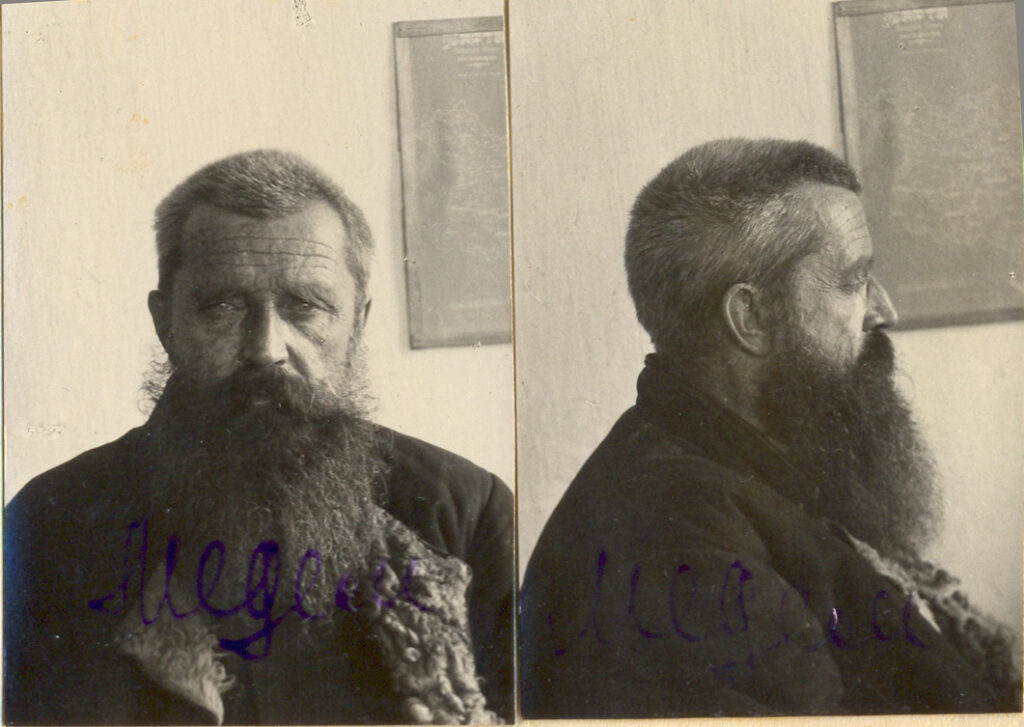
No weapons were found during the search; obviously what you were looking for completely different – a total of 32 items were seized. Basically, this is the correspondence of the count with his daughter Sophia, postcards, envelopes with addresses of acquaintances and friends, “American magazine”, plan of the Khvalynsk district, letters clergy, including Metropolitan Yaroslavl Agafangel (Preobrazhensky) – an outstanding figure Church, now glorified in the face of saints.
On February 13, 1929, the commissioner issued an indictment conclusion on investigative case No. 7. It turned out that The accusation was based on oral material – testimony and denunciations, allowing you to do the following conclusions: “Recently, since February 1927, to the office of the district commissioner of the OGPU, and later, the Volsky district department of the OGPU received information about that Medem often travels to villages located in his former estate, in particular, to the mill of state farm No. 68, where a rumor spreads among the workers and the youth, discrediting the Soviet government.
In addition, Medem, when visiting the villages of Bolshaya Fedorovka and Black Zaton among the peasantry spread a rumor about that the Soviet government is conducting the wrong policy towards the peasants, not being able “manage”, tear up big taxes and what the situation in the economy may improve if private use, then it will be easier for the peasant.
Medem among the clergy and monks of the city of Khvalynsk leads anti-Soviet work. As chairman of the monastery community of believers and with the appeal of Metropolitan Sergius about commemorating the power of Medem among the clergy said: the appeal is caused under the pressure of the firing squad. remember godless power, not only commemorate it and pray for it, but it is necessary to fight against it ”(it is clear that the authorized was not literate, the meaning of the conclusion is clear, the author’s the wording is saved. – A.N. ).
On May 17, 1929, a special meeting at the Collegium of the OGPU of the USSR, having considered the investigative case, decided: Medema Release Alexander Ottonovich from custody, depriving right of residence in Moscow, Leningrad, Kharkov, Kyiv, Odessa, the aforementioned provinces, districts, Nizhnevolzhsky and North Caucasian districts with attachment to a certain place of residence, for a period of three years, counting from January 10 1929.
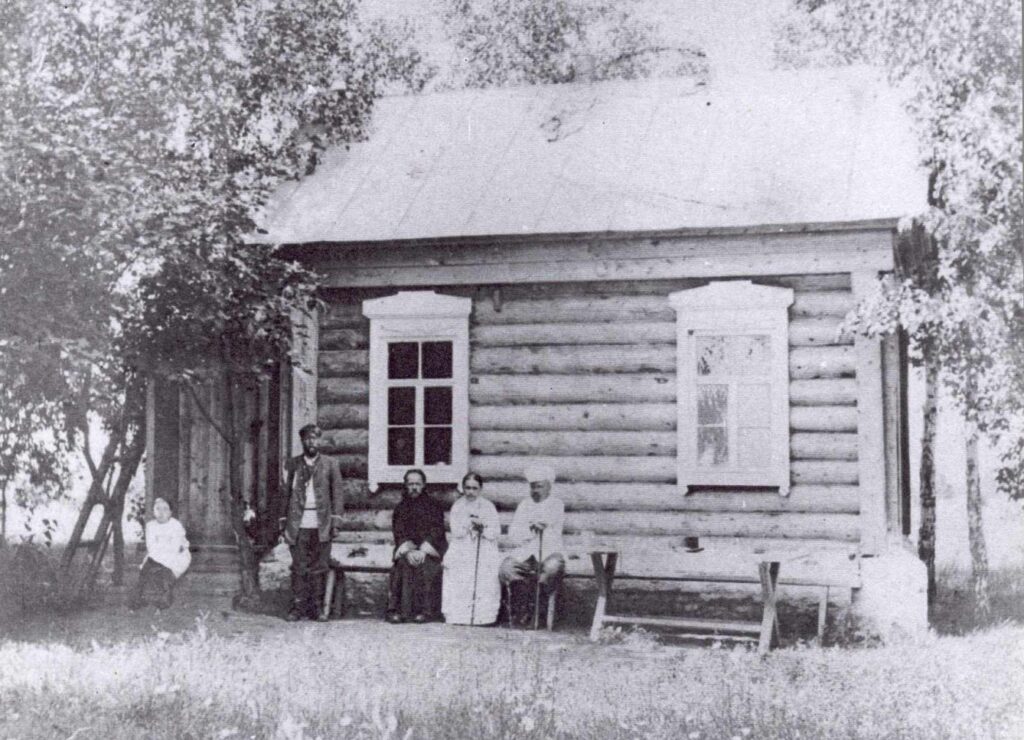
Prohibition on residence in the Nizhnevolzhsky Territory, in the composition which included Khvalynsk, meant a forced parting of Alexander Ottonovich with relatives and loved ones places, the graves of loved ones and, at the very least, a well-established life.
Having stayed in Khvalynsk for a fixed period of time – about two weeks, Alexander Ottonovich went light to Syzran. Fortunately, the city was located near Khvalynsk and near Medemy there were acquaintances.
“Hours in 10-11 p.m. – familiar from childhood disgusting knock. Well, of course, uninvited guests … and I never saw my father again.”
The family’s relative prosperity was short-lived. December 11th 1930 Alexander Ottonovich was arrested again. Junior daughter Medem recalled: “At 10-11 o’clock in the evening – from childhood familiar disgusting knock. Well, of course, uninvited guests … and I no longer have a father saw.”
During interrogations, Alexander Ottonovich, as a competent lawyer and a decent man, behaved nobly and dignifiedly. When the investigator asked him what he adhered to political convictions and what is his attitude to the Soviet authorities, the defendant Medem replied: “Certain I have no political convictions, because I did not work politics. My attitude towards the existing system is loyal. With program of the communist party and the Soviet government, I do not I agree”. When trying to identify “accomplices” of the count, the investigator received the following answer: “Acquaintances in the city of Syzran, whom I visit or who visit me, no. “Hatted” acquaintances, that is, persons whom I I know by name and face, a little; also available in the city Syzran such faces with whom on the street when meeting I bow, but I often do not know their names. name those people whom I know by name and in person, I find it difficult since I know them very little and expose them as I don’t want my good friends.” Perplexed by such during the interrogation, the investigator continued: “Does the you people you know in the city of Syzran? “There are people I know in the city of Syzran. I can’t name them, because I don’t remember them, ” Medem replied. “Do you refuse Citizen Medem, name people you know, or No?” the interrogator did not let up. Alexander Ottonovich confirmed that he was refusing because he did not can remember them. The investigator summed up the answers of the count: on the one hand, the people whom Citizen Medem knew there were, but on the other hand, he did not know them.
Confirming the conclusions of the Chekist, Medem was forced to give the following receipt: “I sign below that me on the part of the case manager was December 28, 1930 announced that I, by my refusal to name people, whom I know in the city of Syzran, I prevent clarifying all the circumstances of the case and, therefore, I withdraw responsibility from the Syzran department of the OGPU in compliance relevant procedural rules regarding the term detention.” Followed by an inscription: “Of the persons whom I know by name, patronymic and surnames, I remember some at the moment, but to name and I refuse these for the reason that to nominate people which I accidentally remembered, thereby making to them injustice – I do not find it possible.
At the beginning of 1931, Alexander Ottonovich’s the tubercular process in the lungs that had long disturbed him, which was associated with lifestyle (he smoked a lot), and with harsh conditions of imprisonment. On February 22, he was transferred to hospital building of the Syzran prison. And at the beginning of spring Sophia and Alexandra came to hear that their father was very ill. They arrived in Syzran, where they were fussing about a date. Finally allowed the next day. “And when we came at the appointed time, – recalled Alexandra, – it turned out to be too late … They answered: “They buried it yesterday.” Where is not said.”
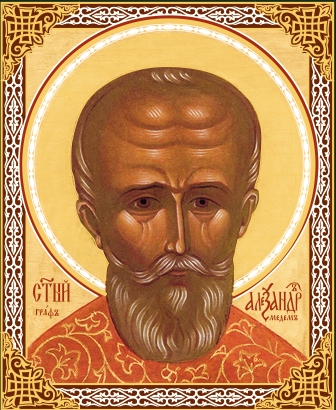
Alexander Medem died on April 1, 1931 from pulmonary edema in prison hospital. April 3 case in connection with death the prisoner was stopped. June 10, 1999 Alexander Ottonovich Medem was rehabilitated.
August 20, 2000 by the decision of the Council of Bishops of the Russian Orthodox Church Alexander Medem was glorified in the face Saints in the Cathedral of New Martyrs and Confessors of Russia.
In 2007, a temple was restored in the former Medemov estate, consecrated in the name of Saints Equal-to-the-Apostles Helena and Konstantin, and in 2010 opened in Khvalynsk Orthodox classical gymnasium named after Saint Alexander Medem. Today it is one of the best educational institutions of the region. In November 2014 at the gymnasium opened a public museum dedicated to the history of life Count Medem.
In 2014 Alexey Naumov at his own expense created the documentary film “Medem”, telling about the holy new martyr Alexander Medem. The film has won multiple awards international film festivals in Serbia, USA, Russia. However in order to release the film in broadcast quality, its needs to be improved, what additional facilities. Fundraising for the film takes place here .
